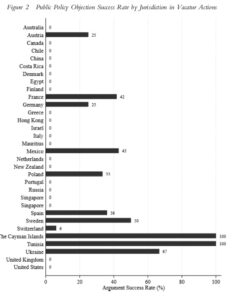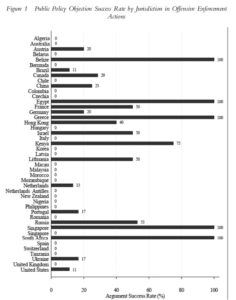One of the articles authored by Dr Monique Sasson and featured in the Journal of International Arbitration Special Issue on Empirical Work in Commercial Arbitration, edited by Dr Monique Sasson, Dr Crina Baltag, Roger P. Alford, Matthew E.K. Hall, under the general editorship of Prof. Dr Maxi Scherer, discussed the public policy in the light of the outcomes of the empirical research.
The empirical research of national court judgements (concerning both vacatur and enforcement of international commercial awards) available in the Kluwer Arbitration Database (the “Database”) revealed that objections based on public policy have been raised in 44% of enforcement proceedings and in 38% of setting-aside proceedings. The success rates of these objections were only 19% and 21%, respectively; however, the number of times in which the public policy objections have been upheld cannot be dismissed as insignificant.
The analysis of national court judgments indicates that the public policy is usually accepted in a limited set of narrow circumstances, though at times certain courts will accord a broad scope to public policy.
The article first examines the concept and definition of public policy, then lists some examples of actions that have been considered a violation of public policy and concludes with a brief analysis of the “maximalist” versus “minimalist” approaches, to application of the public policy exception to enforcement of awards.
The Concept and the Definition of Public Policy
The concept of public policy is widely invoked: Article V(2)(b) of the New York Convention provides that recognition and enforcement of an award “may also be refused” if “recognition and enforcement of the award would be contrary to public policy”. Setting aside provisions in many national arbitration acts also refer to public policy. However, there is no autonomous definition of public policy. Authors, arbitrators and judges have often referred to an autonomous international standard. One of the definitions most frequently invoked identifies “the most basic notions of morality and justice” as constituting public policy.
This narrow interpretation of public policy is necessary to prevent the public policy exception from becoming “a channel to review the award on the merits”. Thus, the invocation of a violation of public policy should not be a mechanism to allow a substantive review of the award, but only a limited review to determine whether the enforcement or the confirmation of the award would seriously infringe fundamental principles. This application of public policy seeks to balance the interest in maintaining autonomy and efficiency of arbitration and, on the other hand, to safeguard fundamental principles of justice.
The International Law Association (“ILA”) adopted a resolution in April 2002 on the interpretation of public policy, stating that
[t]he expression “international public policy” is used in these Recommendations to designate the body of principles and rules recognised by a State, which, by their nature, may bar the recognition or enforcement of an arbitral award rendered in the context of international commercial arbitration when recognition or enforcement of said award would entail their violation on account either of the procedure pursuant to which it was rendered (procedural international public policy) or of its contents (substantive international public policy).
This resolution also highlighted the importance of finality in international commercial arbitration and, at the same time, the need to protect the most basic principles of a State’s system of justice.
Examples of Violations of Public Policy
The Database contains several judgements upholding a public policy objection. These cases included violations of substantive public policy and procedural public policy.
Examples of the first category were: i) violation of national sovereignty (the award directed the respondent to return an area of its national waters for three years to the opposing party); ii) duress (one of the parties was led to understand that he would be kept in prison if he did not sign the arbitration clause), iii) fraud and corruption (there were two conflicting judgements: a) a French court judgment holding that the court had the power to investigate whether the award was tainted by corruption and finding that the court was not bound by the findings of the arbitral tribunal; b) and a English case holding that since the arbitral tribunal had jurisdiction to determine the issue of illegality, there was a very limited scope for an English court to re-examine the issue of illegality); and iv) penalty (disproportionately high penalty) or damages (extremely high interest rate).
Some examples of the second category were: i) breach of due process for lack of impartiality; ii) failure to adequately motivate the award; iii) de facto exclusion of one arbitrator from the tribunal’s deliberations.
Is the Determination by the Arbitral Tribunal binding on the Courts: the Maximalist and the Minimalist Approaches
It remains an open question whether courts should be bound by an arbitral tribunal’s determination of the issue of fundamental principles. The maximalist approach gives more latitude to the courts, while the minimalist approach suggests that the courts are bound by the determination of the public policy issue reached by the arbitral tribunal.
The maximalist approach by retaining the court’s power to decide the issues concerning public policy, implies that the court will investigate the public policy grounds and will decide whether there has been a violation of fundamental principles even if the arbitral tribunal has ruled on the same issue. This approach has been criticized because it may constitute an attempt to revisit the arbitral tribunal’s decision-making, thereby jeopardizing the fundamental principle of finality of arbitration.
The minimalist approach considers that the courts are bound by the determination made by the arbitral tribunal. Critics of this approach have highlighted that by delegating the decision on the issue of public policy to an arbitral tribunal’s evaluation, the State’s control over principles that are the foundation of its justice system is diminished.
Conclusions
The court decisions in the Database show that the public policy objection is commonly raised; it is a sort of “catch-all” objection. The judgments in which this objection have been upheld are typically very detailed and concerned extreme patterns of behavior not often confronted in practice. However, there are some judgments where the courts channeled through public policy a revised determination of the merits of the underlying dispute; this is, of course, a development that carries dangers for international arbitration.
A court’s consideration of public policy objection should seek a balance: (i) the autonomy of arbitration; and (ii) the State’s right to preserve its legal system’s fundamental principles. Achieving this balance will enhance the legitimacy of arbitration as a means to resolve disputes in conformity with the State’s most important rules.
A court’s ‘second look’ at issues of fraud, corruption, sham agreements, and breach of due process is aimed to protect fundamental principles of justice. However, a court’s evaluation of the contents of the applicable law, or the arbitral tribunal’s evidentiary assessment, or the formal requirements of an award, undermines public confidence in arbitration as a final and binding dispute resolution method.


Note: This post refers to an article published in JOIA Special Issue, Volume 39 no 3, pp 411-432. The sources of the references in this post may be found in the footnotes in the JOIA article.
To further deepen your knowledge on Articles V(1)(b) & V(2) of the New York Convention, including a summary introduction, important considerations, practical guidance, suggested reading and more, please consult the Wolters Kluwer Practical Insights page, available here.
________________________
To make sure you do not miss out on regular updates from the Kluwer Arbitration Blog, please subscribe here. To submit a proposal for a blog post, please consult our Editorial Guidelines.



Interesting to see that India was left out of the survey when public policy challenges happen here on almost a daily basis.